 |
| Press Releases | |
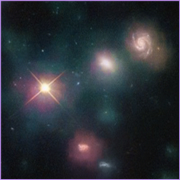 |
University of California, Santa Cruz October 2 , 2007 Multiwavelength images of distant universe now available on Google SkyThe All-wavelength Extended Groth strip International Suvey (AEGIS) is releasing its data this week to both fellow scientists and the general public. It is the first data release from the AEGIS survey and the first release of multiwavelength data to take advantage of the capabilities of Google Sky, a new feature of Google Earth. This week's release features color images from four different satellite telescopes that show how the AEGIS survey field would look if you could see with infrared, ultraviolet, or X-ray vision. More... |
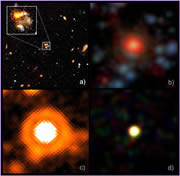 |
University of California, Berkeley March 6 , 2007 Full-spectrum study of small patch of sky yields portrait of maturing universeA massive project to generate an all-color map of the galaxies in a small area of sky, utilizing four satellite telescopes and four ground-based telescopes, is yielding new information about the universe's "pre-teen" years, and the early evolution of galaxies and galaxy clusters. Called the All-wavelength Extended Groth Strip International Suvey (AEGIS), the five-year project involved the cooperation of more than 50 researchers from around the world observing in the radio, infrared, visible, ultraviolet and X-ray regions of the electromagnetic spectrum. More... |
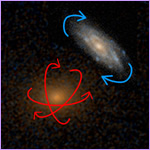 |
University of California, Santa Cruz March 6 , 2007 New principle found to govern galaxy formation and evolutionFaced with the bewildering array of galaxies in the universe, from orderly spirals to chaotic mergers, it is hard to imagine a unifying principle that describes them all. But members of AEGIS have recently shown that the relation between a galaxy's mass and the orbital speed of its stars and gas is remarkably consistent over a wide range of galaxy types and over billions of years of galaxy evolution. More... |
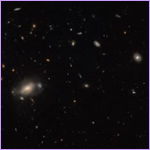 |
Space Telescope Science Institute March 6 , 2007 Hubble pans across heavens to harvest 50,000 evolving galaxiesSeveral hundred images taken with NASA's Hubble Space Telescope have been woven together into a panoramic view of at least 50,000 galaxies. The Hubble view is yielding new clues about the evolution of galaxies in the early universe and the distribution of galaxies in space. More... |
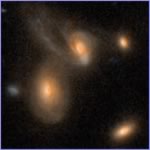 |
University of California, Santa Cruz January 9, 2006 Large survey of galaxies yields new findings on star formationThe AEGIS survey of distant galaxies has shown that star formation is primarily driven by the supply of raw materials, rather than by galaxy-galaxy mergers. Massive galaxies form most of their stars early on in a rapid burst, whereas smaller galaxies form stars slowly over a long period of time. More... |